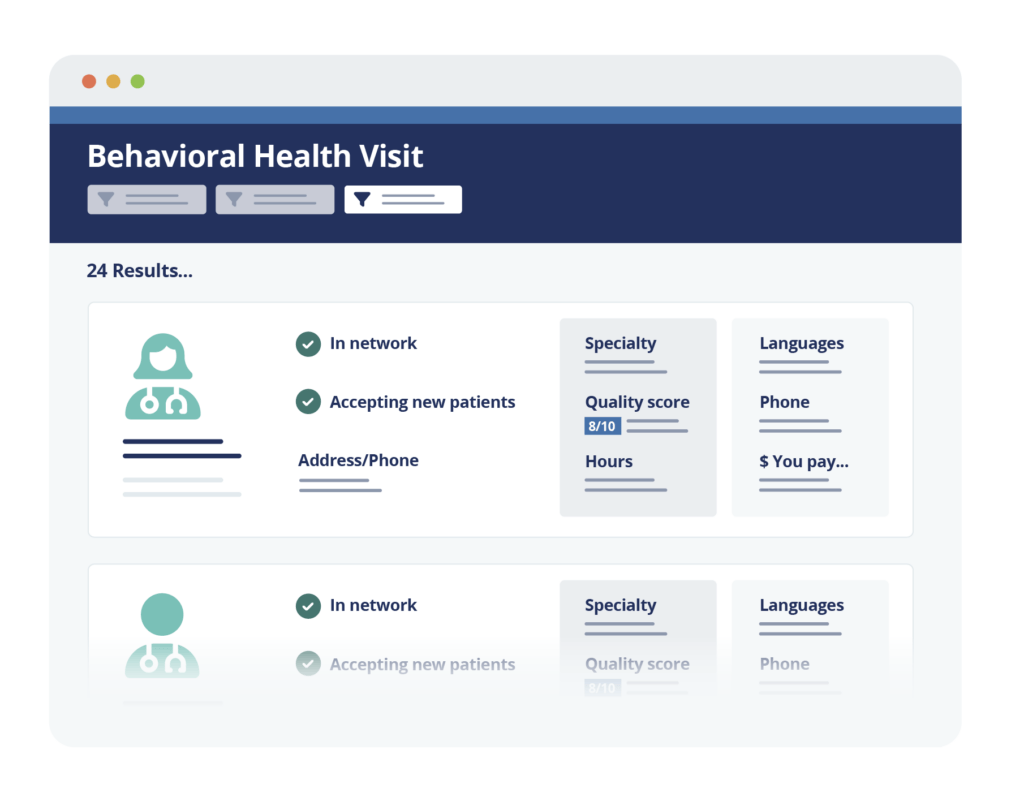
The wonderful city of Nashville, Tennessee, hosted AHIP’s 2024 Consumer Experience and Digital Health Forum. It was an opportunity to learn about digital health best practices and the shifting care delivery landscape. With over 50 interactive sessions, attendees gathered insights that could help them and their organizations deliver personalized care and improve health outcomes. One of those sessions discussed mental health care access and included Koleen Cavanaugh, the Senior Vice President & Chief Marketing Officer of Independence Blue Cross; Cynthia Grant, PhD, LCSW, MBA, the Head of Clinical Excellence of Grow Therapy; and Brandon Spring, the Chief Revenue Officer of Kyruus Health.
The panel discussed the complexity of navigating the healthcare system, especially when it comes to behavioral healthcare. And how digital transparency tools play a critical role in improving healthcare access. They emphasized the importance of removing barriers, empowering patients, and simplifying the often burdensome process of scheduling appointments and accessing care.
The Challenge: A “Sick Care” System
A recurring theme was the growing strain on the primary care system, where patients with mental health needs often seek help. These professionals, however, frequently lack the resources and time to adequately address behavioral health issues, which only exacerbates the problem. With long wait times and a shortage of specialists, many individuals delay seeking care until they are in crisis. This leads to what is sometimes called a “sick care system” rather than a proactive healthcare system focused on prevention and early intervention. All panelists agreed that technology can help deliver more access to care.
“This has been something that has plagued our profession for decades and it is both something that is perceived and felt by patients that are seeking care as well as providers who have a desire to be able to get someone matched for services.”
–Cynthia Grant, Head of Clinical Excellence, Grow Therapy
Empowering Patients Through Digital Tools
To address these challenges, Independence Blue Cross and Grow Therapy have been integrating digital tools that make it easier for patients to access mental health services. One tool both organizations agree is pertinent to increasing behavioral care access is enhanced provider directories. These directories enable patients to schedule mental health appointments with just a few clicks. It also allows patients to not only see who is available for virtual or in-person care but also provides detailed information about providers, including their specialty, language spoken, and availability.

The simplicity of the user interface aims to meet modern patient expectations, especially among younger generations who are accustomed to making reservations or appointments online for almost every aspect of life. And when more people know about these virtual options for care, the more likely they are to access them.
“When the pandemic hit, we sent a message out to our membership just to create awareness of benefits for virtual behavioral health care. And in one week’s time, from that message going out, we saw a 1000% increase in people booking online behavioral health visits. And while we didn’t see that same pattern with traditional health care, that behavioral health has continued. People like the access to virtual behavioral health.”
-Koleen Cavanaugh, Senior Vice President and Chief Marketing Officer, Independence Blue Cross
The Future: Seamless Integration for Improved Access
The discussion closed with optimism. While the complexity of behavioral healthcare, especially when dealing with access to care, will always present challenges, integrating digital tools and collaboration between health systems, payers, and technology companies offers a path forward. Partnerships like these are streamlining processes, making provider directories more accurate, and giving patients the tools they need to take charge of their health and ensure they are choosing the right care.



